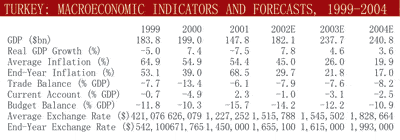If the Turkish government can resist the temptations of a pre-election splurge, the countrys economic future looks brighter than it has for years. But that is a big if.
Astring of encouraging economic indicators, as well as the IMFs decision to extend Turkeys repayment schedule for a year, has sparked a turnaround in market sentiment for an economy that some predicted was poised for collapse. Yet, analysts warn, the government in Ankara must still work hard to support the improved outlook or face a reversal of fortunes in 2004. Much of the improvement in the outlook began in August, when the IMF proclaimed Turkeys three-year stand-by program, signed in February 2002, was back on track. The statement helped ease speculation that the government would not meet its targets, which would have kept it from receiving further disbursements from the $17 billion program.
The IMF has done Turkey a massive favor, says David Lubin, emerging markets economist at HSBC in London, noting that the fund basically gave Turkey some $4.5 billion for next year. In 2004 it was to owe $9.7 billion and will now have to pay only $5.2 billion, while in 2005 it would have had to pay $10.1 billion and will now pay $7.8 billion. The IMF postponed repayment for only a year, adds Lubin, but a year is a long time in Turkey.
The move should help Turkey meet its IMF targets, which include a primary surplus of 6.5% of GDP in 2003 and 2004. While the rescheduling of IMF debt alone falls short of delivering a solution to Turkeys near-term public sector debt challenge, it implies the fulfillment of a necessary condition for numbers to add up in 2004, states a research report published by Global Securities in Istanbul in mid-August. Put differently, without the rescheduling of repayments, the public sector financing gap could have become insurmountable next year, the report concludes.
The IMF now expects Turkeys debt burden to drop from a previous 90% of GDP to a still-worrisome 70%, and fund representatives admit much of the decline will be due to a strengthening of the Turkish lira. The governments ongoing fiscal responsibility, nevertheless, could contribute to a longer-term improvement in the debt situation.
A significant portion of Turkish debt is denominated in foreign currency, and the strength of the lira has alleviated debt-servicing costs somewhat, says Bill Williams, senior vice president and division manager for the Middle East, Eastern Europe and Africa at The Bank of New York. By the same token, the sharp decline in domestic interest rates has reduced the cost of servicing TL-denominated debt. If the government adheres to a strict fiscal program, rates should continue to fall, enhancing this effect.
Whether or not the government will maintain its commitment to the IMF-approved fiscal plan continues to elicit skepticism. As is always the case with Turkey, performance and execution are important factors, adds Williams, noting that markets are expecting the government to perform and show strict adherence to the IMF program. The government has learned that markets react quickly to slippage in the program, he says. The constant challenge is fiscal disciplinenot only committing to it but also executing once they have committed.

|
|
|
Can Government Resist Temptation?
Most analysts would agree that the government has already taken important steps toward achieving longer-term stability. But some argue that the municipal elections next April may pose a temptation for the administration to resort to the traditional

|
|
to start the privatization process |
pre-election spending spree. Fiscal performance may deteriorate in the run-up to the elections next year, says HSBCs Lubin. This happened in 2002, and Im not sure why the market should tolerate this twice in a row. After praising the improved economic performance that should stave off the countrys traditional autumn financial crisis, usually coupled with seasonal inflation and hefty treasury redemptions, a JPMorgan Chase Global Data Watch report from August 15 also warned of the potential for deterioration as the elections draw nearer. In 2004 there is a risk of massive pre-electoral spending that could cause an upturn in real rates and a break with the IMF, notes the report.
This uncertainty over what route Turkish authorities will take led JPMorgan to formulate two sets of forecasts for 2004. One is based on an optimistic scenario in which Turkey meets its IMF commitments and maintains prudent fiscal policy ahead of the elections, leading to 5.5% real GDP growth, 15% CPI inflation and an average exchange rate of 1,835 Turkish liras to the dollar. Under a more pessimistic scenario, in which the government succumbs to loose fiscal policies ahead of the elections, GDP would grow by a mere 1%, with 22% CPI inflation and an exchange rate of 2,180 Turkish liras to the dollar. Under neither scenario, however, does the investment bank foresee a major financial crisis next year.
The government has moved to primary surpluses since 2000 and eradicated the deficits of the 1990s, says Mehmet Simsek, emerging-Europe economist and strategist for Merrill Lynch in London. The key challenge is to maintain fiscal performance. Last year, which was an election year, fiscal performance deteriorated and the surplus was only 3.9% instead of the 6.5% target. The primary surplus target for 2003 is again 6.5%, but additional measures will be needed to meet the challenge. If they fail this year, there will be a credibility gap.
Privatization Under the Microscope

|
|
|
Market players will also monitor the countrys privatization program, as the government puts key assets on the auction block in 2003 and 2004. Among big-ticket items that Simsek feels may attract foreign investorswho have remained on the sidelinesinrecent yearswill be the TEKEL alcohol and tobacco monopoly (bids forecast at $4 billion), the TUPRAS oil refinery and the National Lottery. Weakened demand for telecom and airline assets, on the other hand, could affect potential investors appetite for Turk Telekom, which has already undergone two failed privatization attempts, and Turkish Airlines.
In the past, there wasnt the legal infrastructure to start the privatization process, and there was political meddling during coalition governments, says Simsek, who feels privatization inflows could make the market more comfortable with Turkeys mounting current account gap. The government is on track with its target of $4 billion in asset sales and revenues of $1.2 billion for 2003, although the treasury has included a more conservative $700 million in privatization revenues in its targets, he notes.
I must say that the level of NPLs [non-performing loans] in the system is still on the high side, says Engin Akcakoca,

|
|
rates should continue to fall |
chairman of the Turkish Banking Regulation and Supervision Agency (BRSA). We do understand the difficulties of handling NPLs during and right after a heavy crisis. However, together with the contribution of our banks, this issue is being addressed as per internationally accepted principles. Akcakoca predicts sector consolidation will continue, with foreign players also likely to come into the market to join Italys UniCredito and the UKs HSBC, which remain the only foreign investors in the Turkish banking system. The BRSA will also encourage foreign entries and will not tolerate the existence of irregularly weak banks in the market, notes the bank regulator. Any such consolidation will streamline market shares, contribute to profitability and, in the near future, increase public offerings.
Joining the Union
But heading watch lists next year will be progress in Turkeys efforts to join the European Union, for which Ankara has already introduced economic and political reforms to meet the blocs strict accession criteria. One important hurdle is whether Turkey meets the EUs Copenhagen criteria regarding human rights, for which it has partially eliminated the death penalty, approved an amnesty program for Kurdish separatist rebels, improved freedom of speech guarantees and reduced the power of the military over government institutions. In December 2002 the European Council agreed to review Turkeys progress

|
|
|
on the Copenhagen criteria in December 2004 and, if it decides that the criteria have been met, launch EU accession talks without delay.
Merrill Lynchs Simsek feels that satisfying the Copenhagen criteria may not be enough: Turkey will have to solve its problems with Cyprus, which enters the EU next year, so indirectly this is another condition, he argues. Long-running disputes with Greece and Greek Cypriots have been eased since bilateral talks began between Athens and Ankara in mid-1999.
The turnaround in market sentiment has sent analysts rushing to publish rather divergent forecasts based on potential scenarios, reflecting what some say has been Ankaras unpredictability in the past. With very few exceptions, however, forecasts for 2004 have shifted from gloomy to, at the very least, cautiously optimistic.
Among those taking the latter approach is Daniel Thorniley, senior vice president of the Economist Corporate Network in Vienna. Our view is that there are likely to be some bumps ahead, he said in a memo, but no financial implosion.
Santiago Fittipaldi



